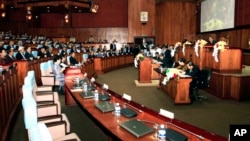When the leaders of both major political parties that won seats in the last election agreed in July 2014 to end a year-long political stalemate, the opposition’s 55 elected lawmakers entered the National Assembly, quickly calling on ministers for questioning on issues of national importance.
However, since July last year, a wave of arrests and court cases brought against opposition Cambodia National Rescue Party officials has stifled debate.
The CNRP’s president, Sam Rainsy, and its deputy leader, Kem Sokha, both face ongoing legal proceedings that could lead to imprisonment.
Since the cases against Sokha and Rainsy were initiated, a new parliamentary boycott was started by the opposition, which analysts now say was a serious misstep that has allowed the Prime Minister Hun Sen’s ruling Cambodian People’s Party to get a free pass in the legislature.
Sam Kuntheamey, head of the election monitoring group Nicfec, said the continued boycott of parliament by the CNRP was hurting the party’s legitimacy.
“It’s not beneficial to society when they don’t enter meetings, because they represent [almost] half of the population throughout the country, with 55 seats. With 55 seats, it’s a lot for millions of people. When their voices are not heard during the enactment of laws and other things, it’s a severe loss,” he said.
Kuntheamey urged the CNRP to reconsider its position and re-enter parliament so that the CPP could be challenged.
The so-called culture of dialogue that was initiated in a meeting between Hun Sen and Rainsy on July 22, 2014, that ended the post-election boycott, has been abandoned, and Meas Ny, a social researcher, says that despite the ongoing difficulties that lawmakers face in carrying out their duties, the deteriorating political situation means that their presence in parliament has never been more needed.
“Regarding the recent murder of Kem Ley, I think that opposition members of parliament could write a petition to convene a session of the National Assembly to question government officials in order to speed up investigation,” he said, referring to the July 10 fatal shooting of a prominent local political analyst and dissident.
“I think if they don’t enter parliament, the tense political situation will continue,” he added.
Lawmakers have the right according to parliamentary procedure to summon officials for questioning and to publicly submit questions to the government, which the government is then obliged to respond to.
While analysts spoken to for this story said this mechanism should be made use of in the current political climate, Son Chhay, the CNRP’s chief whip, said the legal action taken against senior party members had driven lawmakers away from the legislature, adding that they continued to conduct casework outside of the National Assembly.
“I want to clarify that we always pay attention to our work … we must use our duties and activities in the state framework to serve the people at the highest level,” he said.
Despite the absence of the CNRP in sessions, Sok Eysan, a CPP spokesman, said parliament could continue to pass laws and ratify agreements, despite the rules stating that a majority of lawmakers must vote in favor of a decision.
The ruling party argues that the parliamentary code refers to a majority of lawmakers who attend a session, rather than of the total elected members. However, as the CPP holds a majority of the seats – 68 out of a total of 123 – even with the presence of the CNRP it is likely that the CPP could push through any laws in a majority vote.
“If the other party doesn’t attend, and parliament is attended by only CPP lawmakers, they can still pass laws as it only requires 50 percent plus one,” Eysan said.







